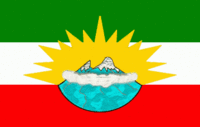Kurdistan
| Conventional short name: | |
| Local: | Kurdîstan |
| English: | Kurdistan |

| |
| National motto: "Kurdun heval ninin bes ciya" (The Kurds have no friends but the mountains) | |
| Language: | Kurdish dialects, Syriac, Armenian, Arabic, Persian |
| Cities: | |
| Capital: | Amed |
| Largest: | Amed |
| Other: | Erbil |
| General Secretary of the Kurdistan Workers' Party: | Elî Ehmed Barzanî |
| Prime Minister: | Dawid Zekeriya |
| Area: | AREA |
| Population: | 18,293,447 Kurdish |
| Independence: | from Ottoman Empire |
| Declared: | 1920 |
| Recognized: | DATE OF RECOGNITION |
| Independence: | from Republic of Kurdistan |
| Date: | 1962 |
| Currency: | CURRENCY |
| Organizations: | Communist International (Comintern)
--> |
Kurdistan is a communist republic in the Middle East.
Administration
Government
Kurdistan is a communist state.
Administrative Divisions
LIST OF ADMINISTRATIVE DIVISIONS
History
Before the First Great War, most Kurds lived within the boundaries of the Ottoman Empire. After the collapse of the Ottoman Empire in 1922, several new countries were created within its former boundaries. Among them were Kurdistan, Armenia and Lebanon. However, the most important successor state of the Ottoman Empire was the Anatolian Kingdom of Turkey.
Displeased with the size of Turkey's territory, the its leadership initiated a long and costly war, but because of a transitory alliance of Kurdistan and Armenia, the Turks were finally defeated and a renegotiation induced, causing the Treaty of Lausanne, which rescinded all possible claims of Turkey, Iraaq and Syria to this land.
Kurdistan has minor oil producing capabilities, and was an instrumental staging ground in the Al-Basran War.
Geography
Borders
North: Armenia.
West: Turkey.
South: Syria, Iraaq.
East: Persia.